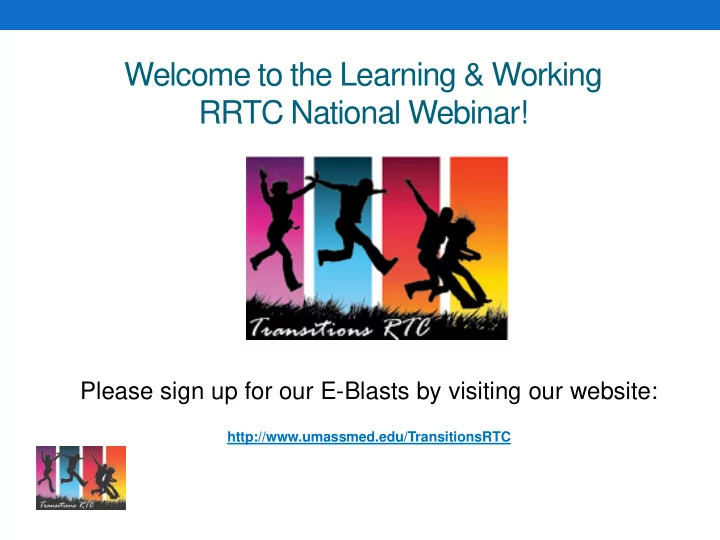

Welcome to the Learning & Working RRTC National Webinar! Please sign up for our E-Blasts by visiting our website: http://www.umassmed.edu/TransitionsRTC
Acknowledgements The Learning & Working Transitions RRTC is a national effort that aims to improve the supports for youth and young adults, ages 14-30, with serious mental health conditions to successfully complete their schooling and training and move into rewarding work. We are located at the University of Massachusetts Medical School, Worcester, MA, Department of Psychiatry, Systems & Psychosocial Advances Research Center. Visit us at: http://umassmed.edu/TransitionsRTC This webinar is presented through grant funding from the National Institute on Disability, Independent Living, and Rehabilitation Research, and from the Center for Mental Health Services of the Substance Abuse and Mental Health Services Administration, United States Department of Health and Human Services (ACL GRANT # 90RT5031, The Learning and Working Transitions RRTC). NIDILRR is a Center within the Administration for Community Living (ACL), Department of Health and Human Services (HHS). Additional funding provided by UMass Medical School’s Commonwealth Medicine division. The contents of this presentation do not necessarily represent the policy of NIDILRR, ACL, HHS, and you should not assume endorsement by the Federal Government.
TOOLS FOR SCHOOL: COLLEGE ACCOMMODATIONS FOR STUDENTS WITH PSYCHIATRIC DISABILITIES Laura DiGalbo, M.Ed, CRC, LPC Ms. DiGalbo has worked in the fields of Rehabilitation & Education for over 30 years - including 34 years as a Clinical & Program Consultant for the Bureau of Rehabilitation Services in Connecticut. She is currently an adjust faculty member at Central Connecticut State University. Laura has special expertise in the retention of college students who may need help coping with the rigor of college coursework, including students with psychiatric disabilities.
Tools for School: College Accommodations for Students with Psychiatric Disabilities • Laura DiGalbo M.Ed, CRC, LPC • ldgalbo@aol.com • 860-841-7212
It’s All about Understanding the ADA : Titles 2 and 3 Readiness for Post Secondary Education Documentation of Disability Substantial Limitation Criteria Accommodation Requests Self Advocacy
Readiness…Not Only Symptom Control • Perspectives on Readiness • Cognitive Ability: “Otherwise Qualified” • Psychiatric Symptoms : Globally Reflected in Cognition
Requirements of ADA: The Adult World • Definitions of Title 1 and Title 2 • Documentation of Disability: Recency Sufficiency • Substantial Limitation…to Function
So what is An Accommodation Anyway? • Not Modification • Process Differentiation • Utilized Only Where and When Required • Individually Designed
Some Deficit Generalities: Cognitive Repercussions of Psychiatric Disabilities • Slowed thinking • Slowed response time • Word retrieval difficulties
Some Accommodation Generalities • Anxiety Issues: Pre processing • Depression Issues: Broken Time • Axis 1 Issues: No “demand responses” • Interaction Issues: Alliance Building
Accommodation Requests and Approval: Everyone’s Role • Clinical Professional’s Role: Diagnosis Functional Limitations • Disability Services Staff Role: Explaining Process and Environment Designing/ Allowing Accommodations
Disability Services Professionals • Must accept the Diagnosis and Functional Limitations as stated by the Clinical Professional BUT • Are not required to implement the specific Accommodations requested, provided different accommodations address the functional limitations •
Self Advocacy: Essential Under the Law • Student must: Disclose the Disability Provide the Documentation Explain the Functional Limitations Request specific Accommodations • Disability Services may not “Inquire”
Your Role Prepare Students for the Process: • Requirement to represent themselves • Assist in obtaining documentation • Discuss diagnosis and how it may effect Post Secondary Education • Discuss what to ask for: Accommodations
Your Role [con’t] Once the Student is in School : • Meet with student on and off campus • Guide the student to meet regularly with Disability Services Staff • Provide emotional support at “high stakes” time of year and day
Our Clients can be Quite Successful in Post Secondary Education PROVIDED • They know Themselves ,their Disability and their Functional Concerns • What will help them to become Engaged Students AND Are comfortable explaining that information
Stand Beside Them…Don’t Lead the Way Your Support and Knowledge to Access and Adjust to Campus Life IS Their Pathway to Success
We Are Ending Your Questions and Thoughts ??????
Closing Information • Webinar will be posted until mid-June. • During that time I will be available for questions or dialogue at: ldgalbo@aol.com Or (860) 841-7212 Laura DiGalbo M.Ed,CRC,LPC
Wrap-Up • Posting of slides and recordings on the Transitions RTC website http://umassmed.edu/TransitionsRTC/ Contact Us! Marsha Ellison - Marsha.Ellison@umassmed.edu Laura DiGalbo - ldgalbo@aol.com
Recommend
More recommend